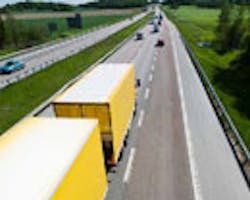BOSTON. Longer combination vehicles and heavier gross weight limits are needed to reduce the environmental impact of trucks while also addressing requirements for greater freight productivity, according to a top executive at Volvo Trucks North America. "We need to change public paradigms" on truck weights and lengths, said Scott Kress, sr. vp of sales & marketing, at an environmental summit during the Boston stop of the Volvo Ocean Race.
"Marginal investments needed in the infrastructure" to accommodate large trucks will allow fewer trucks to carry the same amount of freight, Kress said, resulting in less fuel consumption, a reduction in truck trips, a decrease in greenhouse gas emissions and generally greater productivity in freight systems.
Issuing "a call to action," Kress said, "The time is right because of pressure to reduce congestion, the need to eliminate costs in a recession, new infrastructure initiatives and the growing focus on environmental issues." Asked if VTNA would include other truck makers in the large truck initiative, Kress added that "We will work with any OEM who wants to participate."
BOSTON. Longer combination vehicles and heavier gross weight limits are needed to reduce the environmental impact of trucks while also addressing requirements for greater freight productivity, according to a top executive at Volvo Trucks North America. "We need to change public paradigms" on truck weights and lengths, said Scott Kress, sr. vp of sales & marketing, at an environmental summit during the Boston stop of the Volvo Ocean Race.
"Marginal investments needed in the infrastructure" to accommodate large trucks will allow fewer trucks to carry the same amount of freight, Kress said, resulting in less fuel consumption, a reduction in truck trips, a decrease in greenhouse gas emissions and generally greater productivity in freight systems.
Issuing "a call to action," Kress said, "The time is right because of pressure to reduce congestion, the need to eliminate costs in a recession, new infrastructure initiatives and the growing focus on environmental issues." Asked if VTNA would include other truck makers in the large truck initiative, Kress added that "We will work with any OEM who wants to participate."
Also on the seminar panel, American Trucking Assns. president & CEO Gov. Bill Graves endorsed efforts to increase maximum truck GWVs to 97,000 lbs. across the country. While overnight transformation isn't possible, Graves suggested one possible first step might be including a demonstration project in the next highway reauthorization bill to create a dedicated truck lane just for larger truck combinations.
Leif Johansson, president & CEO of the Volvo Group and the third panel member, also pointed out that "environmental sustainability means reducing costs and impacts." In addition to the large truck initiative, Johansson cited hybrid technology and the next generation of renewable fuels as important contributors to sustainability for truck freight transportation.
Talking about current market conditions in an earlier press conference, VTNA president & CEO Per Carlsson said he sees "some indications in the economy that conditions are stabilizing and some clear signs of recovery." April brought "increased activity in new and used truck sales, and in general we saw higher activity levels in customer contacts and requests for quotes," he said. "That [increase] is starting from very low levels, but I think it's fair to say we see some signs of higher activity."
A substantial rebound in truck sales probably isn't likely before the fourth quarter, Carlsson said. He pointed out that VTNA is already starting to prepare for production transition to SCR technology to meet 2010 emissions requirements. "Depending on when customers buy, there will be limitations on [the number of trucks] we can supply with '07 engine technology," he said.
Asked about rumored VTNA plans to re-enter the medium-duty truck market either with existing European and Asian products or new trucks, Carlsson would only say that the company "is always evaluating product offerings."
Seconding expectations for a rebound in U.S. Class 8 truck sales in the fourth quarter of 2009, Johansson said at a later press conference that he "wouldn't make the same bet about Europe." While the U.S. is further through the economic downturn and has an older average age for its fleet, Europe has a relatively young truck population, he said. Also, the U.S. government's stimulus package should begin to have some impact on truck sales later this year, but uncoordinated responses to the downturn by European governments could lead to "slower truck sales for a few years," according to Johansson.
About the Author
Jim Mele
Jim Mele is a former longtime editor-in-chief of FleetOwner. He joined the magazine in 1986 and served as chief editor from 1999 to 2017.
